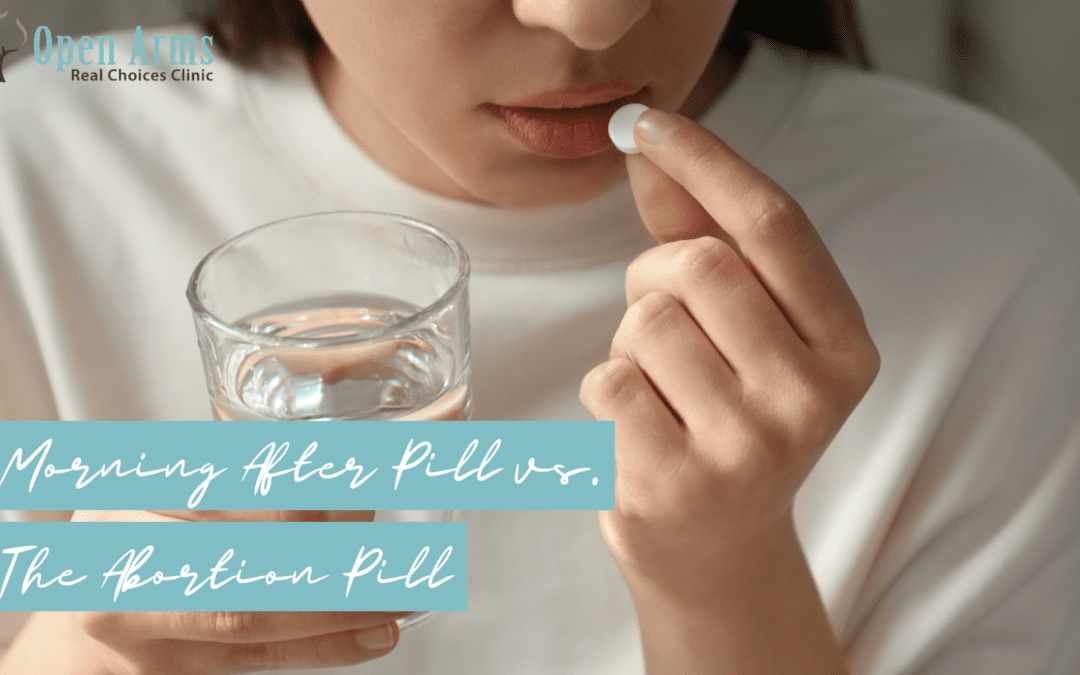There are several kinds of pills designed to prevent or terminate a pregnancy. Despite their similar names, however, the contraceptive pill, the morning-after pill, and the abortion pill are all different.
The phrase “the pill” refers to a contraceptive pill used on a regular basis that affects a woman’s ovulation cycle. Medical sources including the Cleveland Clinic assert that it is about 99% effective if taken daily at the same time without fail. The “morning-after pill,” however, is different. As its name suggests, it is prescribed to women who have already had unprotected sexual intercourse. It is also referred to as “Plan B,” which is also the brand name for one type of morning-after pill. Neither the pill nor the morning-after pill are the same as the abortion pill.
Although there are a few different types of the pill, in general, it contains synthetic versions of natural hormones: progestin, and estrogen. It works in one of several ways: by interrupting the natural course of a woman’s menstrual cycle to prevent ovulation, by thickening the mucus in the cervix to prevent sperm from entering the uterus, or by thinning the lining of the uterus to prevent a fertilized egg from becoming attached. It is important to note that this last effect – preventing a fertilized egg from implanting properly in the uterus – means that the pill can act as an abortifacient.
The morning-after pill is very different. As explained on the WebMD site, it contains one of several drugs, either levonorgestrel (brand Plan B One-Step) or ulipristal acetate (brand Ella), that either prevents or delays ovulation and thus stops the patient from getting pregnant. It can cause unpleasant side effects, such as headaches, dizziness, nausea, vomiting, and cramping.
Unlike the contraceptive pill, the morning-after pill works after you’ve had intercourse, not before. Also, it is not as effective as other birth control methods. If taken immediately, the risk of pregnancy may be reduced by 95%. It can be taken up to 72 hours after intercourse, but if taken beyond 24 hours after intercourse, it will only be around 75% effective because your egg could already be fertilized.
What About the Abortion Pill?
The abortion pill is much different. As noted by the Mayo Clinic, the use of the abortion pill is also called a chemical abortion or medical abortion. Accordingly, it is not used to prevent pregnancy, but to end a viable pregnancy by inducing an abortion. The abortion pill is actually a regimen of two different drugs: mifepristone and misoprostol. The first drug ends a viable pregnancy by blocking a woman’s natural production of progesterone, a hormone necessary for a healthy baby, and it causes the baby to detach from the uterus, depriving the baby of oxygen and nutrients. The second drug induces very strong uterine contractions to expel the deceased baby.
The abortion pill may not be administered to women who are more than 10 weeks pregnant. Common side effects include heavy bleeding, cramping, nausea, vomiting, and diarrhea. According to statistics compiled by the Charlotte Lozier Institute, about 20% of women who undergo a chemical abortion will experience some medical complication.
What Should I Do If I May Be Pregnant?
If you are concerned about getting pregnant unexpectedly, contact us at Open Arms Real Choices Clinic. You can speak to one of our lay counselors about your situation. We do not provide abortions, but we can give you information about your options if you have an unplanned pregnancy. We can also determine whether you may have an STD by screening you for gonorrhea, chlamydia, bacterial vaginosis, and more.
If you might be pregnant, we can provide you with a free lab-quality pregnancy test and limited obstetric ultrasound to confirm the viability of the pregnancy. Then, we can accompany you as you decide whether to keep the baby or place the baby with an adoptive family. If you choose to keep your baby, we can assist you in learning new skills, such as prenatal care, conflict resolution with your partner, and effective communication.
Modern medicine offers many benefits, yet today it is often used not to cure ailments, but to suppress and alter the natural functions of a healthy body. The pill, the morning-after pill, and the abortion pill are all designed to disrupt the natural female cycle. These drugs that can prevent or stop pregnancy or induce an abortion often cause both physical and emotional damage. If you think you may have gotten pregnant, call us at Open Arms Real Choices Clinic to book an appointment.


